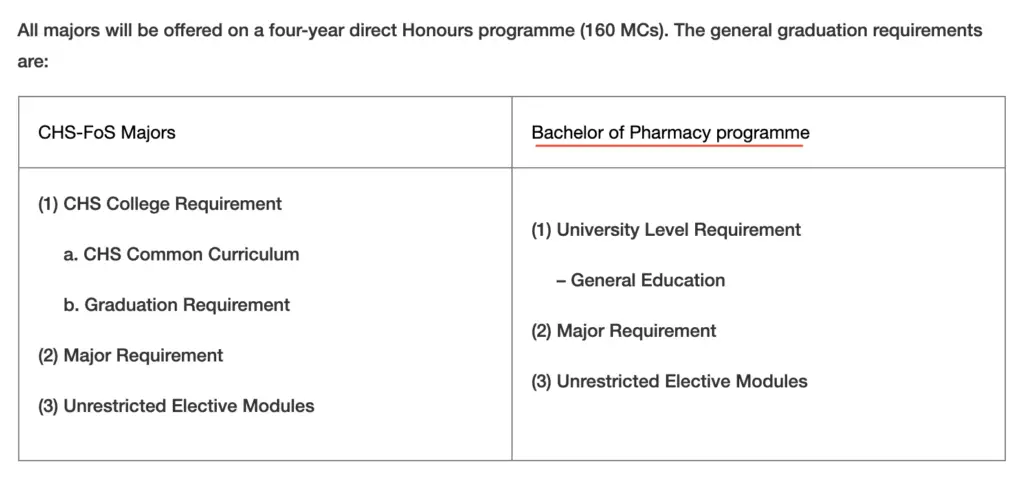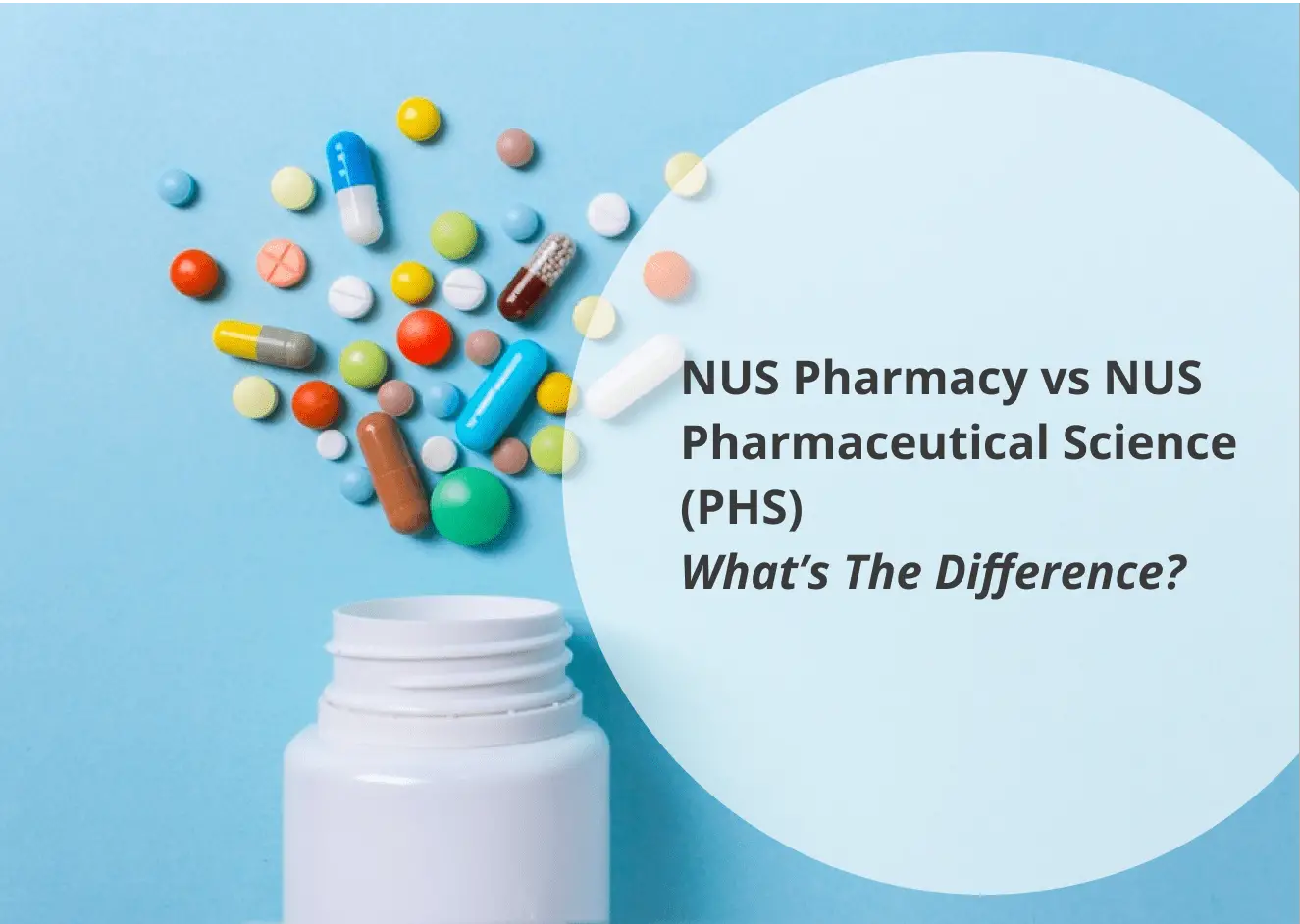If you’re looking to take a degree in Pharmacy in Singapore, you may have noticed that NUS actually offers 2 different degrees: NUS Pharmacy and Pharmaceutical Science (PHS).
How are these 2 courses different, and which should you choose?
Here’s what you need to know:
Contents
Degree obtained
For NUS Pharmacy, you will receive a ‘Bachelor of Pharmacy (Honours)‘ degree. This has been renamed from the ‘Bachelor of Science (Pharmacy) Honours’ degree as of AY2020/2021.
Meanwhile, for PHS, you will receive a ‘Bachelor of Science (Pharmaceutical Science)‘ degree, which is a part of the new College of Humanities and Sciences (CHS).
This will have implications on the ‘University Requirement’ modules that you’ll need to take, which we will explore later.
However, you may want to take note that the PHS degree is a direct admission course.

This means that you need to secure a place at PHS, instead of applying through CHS, which you will be doing so if you’re applying to other courses like Life Science and Chemistry.
IGP required to enter
For both NUS Pharmacy and PHS, you are required to do very well in either your A-Levels or Polytechnic studies. Here is the IGP for AY 2022/23:
| 10th Percentile | 90th Percentile | |
|---|---|---|
| NUS Pharmacy (A Level) | AAA/A | AAA/A |
| NUS Pharmacy (Poly) | 3.91 | 3.99 |
| NUS PHS (A Level) | AAA/A | AAA/A |
| NUS PHS (Poly) | NA | NA |
There were no indications of the Polytechnic GPA required for NUS PHS due to the small sample size.
You’ll need to get a perfect score for A-Levels to stand a good chance of entering either course! Moreover, the 10th percentile GPA for polytechnic students in NUS Pharmacy is actually higher than that of medicine (3.82).
If you are thinking of entering university from a polytechnic, you can check out this guide here.
Another thing you may want to consider is the cohort sizes of these courses:
| NUS Pharm | NUS PHS | |
|---|---|---|
| Cohort size | 168 | 59 |
The cohort sizes are rather small, especially for NUS PHS. This may make it really competitive for you to get a spot in the course!
Most likely, you may need to go for an interview if the number of applicants is greater than the number of available slots.
You may also want to note that you are required to undergo some compulsory vaccinations (e.g. Varicella, MMR and Hep B) if you enter NUS Pharmacy. These are required by MOH for most healthcare professions.
Course modules
Here is a comparison between the types of modules that you’ll be taking in either course:
| NUS Pharmacy | NUS PHS | |
|---|---|---|
| Programme Requirements | 124 | 60 |
| University Requirements | 24 | 52 |
| Unrestricted Electives | 12 | 48 |
And let’s dive deeper into the structures of these 2 courses:
NUS Pharmacy is more clinical based
The modules that you take in NUS Pharmacy are very heavily focused on the clinical aspect of pharmacy.
The course mainly focuses on the pathophysiology of the different disease states, as well as the pharmacotherapeutics of each disease.
What this means is that the course will teach you why a certain disease happens in a patient, and what medications are used to manage the patient’s condition.
You will learn a variety of disease states, such as:
- Gastrointestinal disorders
- Cardiovascular disorders
- Respiratory disorders
- Renal disorders
- Infectious diseases
Moreover, you will be able to take on a Discovery Project in Year 3 (PR4191), as well as undergo some internships in Year 4.
In total, you will be required to take 124 Modular Credits (MCs) worth of ‘Programme Requirements’, with approximately 3-4 core modules per semester.
This may make it quite rigid especially if you’re planning to take certain Unrestricted Electives (UEs)!
The Bachelor of Pharmacy programme is offered separately from the other CHS majors.

Particularly, this means that the University Requirement modules will differ between NUS Pharmacy and other CHS majors.
You are only required to take 6 General Education modules, which is similar to other courses in NUS apart from CHS:
| Module Code | Module Description |
|---|---|
| GEC | Cultures and Connections |
| GEX | Critique and Expression |
| GEA | Data Literacy |
| GEI | Digital Literacy |
| GESS | Singapore Studies |
| GEN | Communities and Engagement |
You are able to choose which module you can take for each pillar, except for GEA1000 which is the only module in the GEA pillar.
The number of MCs of University Requirements for NUS Pharmacy (24) is much lower compared to PHS (52).
Moreover, you will only be required to take 12 MCs worth of Unrestricted Elective modules. This is much lower compared to PHS as well.
However, this is mainly because you are required to take a lot of MCs (124) to meet your Programme Requirements in NUS Pharmacy!
NUS PHS is more lab-based
Meanwhile, for NUS PHS, you are only required to take 60 MCs worth of ‘Programme Requirements‘. You will be allocated more ‘Unrestricted Elective’ modules, which gives you some
The main bulk of the ‘Programme Requirements’ mods that you’ll be taking is PHS modules, including:
- Foundations of Medicinal Chemistry and Biochemistry
- Pharmaceutical Formulations
You may be familiar with some of these concepts if you took H3 Chemistry during JC.
However, there are some modules that you’re taking which are Life Science modules (LSM):
- LSM2212 Human Anatomy
- LSM3211 Fundamental Pharmacology
This would mean that for these mods, you will be doing it together with the Life Science cohort, and not just among your PHS cohort.
The focus of PHS is more on:
- Laboratory techniques
- Formulation of drugs
- Pharmacokinetics and toxicokinetics
If you prefer the laboratory aspect of pharmacy compared to the clinical aspect, then NUS PHS may be more suitable for you.
In NUS PHS, you are able to take more Unrestricted Electives (48 MCs) compared to NUS Pharmacy, which may give you more flexibility. You are also able to take on an Undergraduate Research Opportunities Programme in Science (UROPS), if you’re interested in research.
Otherwise, it is also possible for you to apply for an internship too.
However, as part of the new requirements of the NUS College of Humanities and Sciences (CHS), you will be required to take 52 MCs worth of modules under the ‘Common Curriculum’.
Meanwhile, NUS Pharmacy students are only required to take 20 MCs worth of ‘University Requirement’ modules.
In the end, you are given much more flexibility to choose the modules that you wish to take in PHS, compared to NUS Pharmacy. This is mainly because you are able to take more Unrestricted Electives in PHS compared to NUS Pharmacy.
You may also want to note that you may not be able to download any past year exam papers for either course.
Extracurricular activities
Apart from the academic requirements and modules that you’ll need to meet, you will be able to participate in some programmes outside of the curriculum.
You are able to take UROPS with either course
If you have an interest in research, it is possible for you to take a research opportunity with UROPS. This can be done either in 1 semester, or in 2:
| 1 Semester | 4 MCs |
| 2 Semesters | 8 MCs |
It may be quite tough to schedule a 2-semester UROPS as an NUS Pharmacy student, mainly due to the packed schedule because of the ‘Programme Requirements’ you are required to complete.
NUS PHS offers UPIP (Internship Programme)
You are able to take part in an Undergraduate Professional Internship Programme (UPIP). Some students have managed to take internships at different pharmaceutical companies, such as:
- GSK
- AstraZeneca
- Roquette
If you successfully complete your internship, this will be counted towards the MCs under the ‘Unrestricted Elective‘ category.
Future prospects
One of the main questions that you have would be: ‘what can I do after getting a degree in either course?’
Here are some considerations for you:
You are able to obtain a Pharmacist licence after NUS Pharmacy
If you are taking an NUS Pharmacy degree, the end goal would most likely be to obtain a Pharmacist licence.
At the end of your 4-year course, you are still required to undergo another 6 months of Pre-Registration training at an SPC-approved training institution.
After completing your Pre-Registration training and passing the SPC Competency Test, you will be able to obtain the Pharmacist licence and practice as a pharmacist.
You may want to note that you are required to fulfil certain Continuing Professional Education (CPE) requirements every 2 years to maintain your licence.
With this licence, you are able to play various roles in the healthcare sector, including:
| Role | Examples |
|---|---|
| Community Pharmacist | Unity, Guardian, Watsons |
| Hospital Pharmacist | TTSH, KTPH |
| Polyclinic Pharmacist | Yishun Polyclinic |
| Intermediate-Long Term Care (ILTC) Pharmacist | Ren Ci Community Hospital |
However, it is possible for you to venture to other areas apart from clinical pharmacy, such as:
- Regulatory Pharmacist
- Academic Pharmacist (Research)
- Health Informatics Pharmacist
NUS PHS provides you with job prospects in the pharma industry
If you are looking more towards jobs in the pharma industry, NUS PHS will be more suitable for you. In this course, you will be learning laboratory techniques and formulation technology, which is more geared towards the R&D aspect of pharmacy.
You will most likely be working at one of the pharma companies, or even be a healthcare entrepreneur!
There is quite a lot of flexibility that you have with this degree. However, you will not be eligible to undertake the Pre-Registration training by the Singapore Pharmacy Council.
This is because the curriculum for NUS Pharmacy is very specialised, and only graduates from this course will be able to do Pre-Registration training.
As such, you will not be able to get a Pharmacist licence at the end of your 4-year course!
Verdict
Here is a comparison between these 2 courses:
| NUS Pharmacy | NUS PHS | |
|---|---|---|
| Degree obtained | Bachelor of Pharmacy (Honours) | Bachelor of Science (Pharmaceutical Science) |
| Part of CHS? | No | Yes |
| IGP (A-Level) | AAA/A | AAA/A |
| Cohort size | 168 | 59 |
| Compulsory vaccinations? | Yes | No |
| Programme Requirements (MCs) | 124 | 60 |
| University Requirements (MCs) | 24 | 52 |
| Unrestricted Electives (MCs) | 12 | 48 |
| Pharmacy licence? | Yes | No |
| Career prospects | Clinical pharmacist | Pharma industry (more flexible) |
Conclusion
Although both NUS Pharmacy and NUS PHS are offered by the Department of Pharmacy, they are rather different in terms of the course modules, and future career prospects.
As an NUS Pharmacy graduate, you will most likely become a clinical pharmacist, where you will be playing a part in direct patient care.
However, it is still possible for you to perform other roles, such as being a regulatory pharmacist.
Being an NUS PHS graduate allows you to have the skills required to explore roles in the pharma industry, particularly in R&D. This will be more suited for you if you do not want to be involved in direct patient care, but more on the research aspects.
You may want to note that you will not obtain a Pharmacist licence if you are an NUS PHS graduate!
If you enjoyed this content, do follow us on Telegram!

Want to earn some money while sharing your experiences in Singapore? We’re always looking for writers and you can join our team here!
